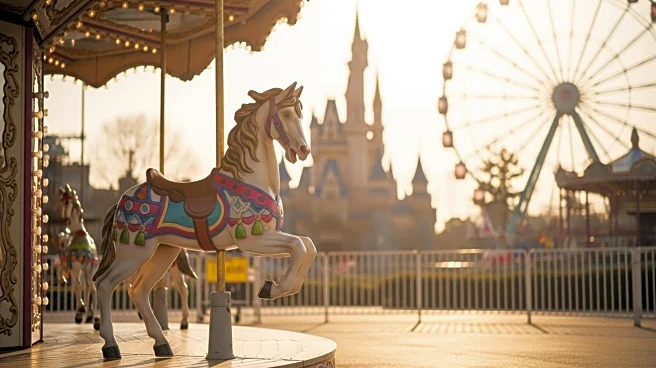What's Happening?
Disney Parks have announced significant price increases for their tickets and passes, affecting both Disney World and Disneyland. According to recent reports, one-day, single-park tickets now exceed $200 during peak vacation times, marking a 5% increase at the Orlando resort and an 8.7% increase at Anaheim's original park. Additionally, the cost of Lightning Lane passes has risen, with Disneyland charging $34 per pass and Disney World increasing multipass prices by $4 to $6. Annual passes, known as Magic Keys at Disneyland, have also seen hikes, with the 'Inspire Key' now priced at $1,899 and the 'Believe Key' at $1,474. Lower-tier passes remain unchanged, reinforcing concerns that these moves may exclude middle- and lower-class families during peak times.
Why It's Important?
The price increases at Disney Parks come at a time of economic uncertainty, potentially impacting accessibility for many families. The decision to raise prices may be seen as a strategy to cater to wealthier visitors, which could affect Disney's public image and customer base. As the holiday season approaches, these changes might influence travel plans and spending patterns, with potential repercussions for the tourism industry. The move also highlights broader economic challenges faced by entertainment companies, as they navigate fluctuating consumer demand and operational costs.
What's Next?
Disney Parks are set to introduce new attractions, including The Muppets Rock n’ Roller Coaster at Disney’s Hollywood Studios next summer and Zootopia Better Zoogether! at Animal Kingdom in November. These developments may attract visitors despite the price hikes. Additionally, improvements to existing attractions, such as the animatronics at Frozen Ever After in Epcot, could enhance visitor experiences. However, whether these updates will justify the increased costs remains to be seen, as Disney continues to balance innovation with affordability.
Beyond the Headlines
The price hikes at Disney Parks may reflect broader trends in the entertainment industry, where companies are adjusting pricing strategies in response to economic pressures. This situation raises ethical questions about accessibility and inclusivity, as higher costs could limit access for diverse audiences. The focus on premium experiences might shift the cultural landscape of theme parks, emphasizing exclusivity over mass appeal. Long-term, these changes could influence consumer expectations and redefine the theme park experience.









